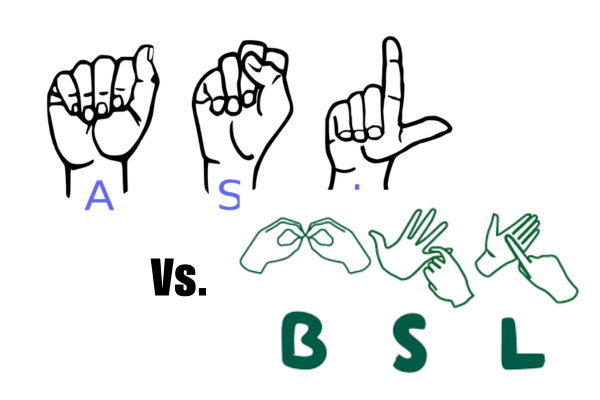Imagine having a close friend in the Deaf community whose stories you yearn to understand. Perhaps a cherished family member struggles with hearing loss, and you long to bridge the communication gap. Or maybe you’ve experienced hearing loss yourself and are seeking a new way to express yourself. Whatever your reason, Sign Language offers a unique and rewarding path. Together, let’s discover a new way to communicate, connect, and grow!
Languages like American Sign Language (ASL) and British Sign Language (BSL) serve as the primary communication tools for Deaf people, fostering a diverse cultural tapestry.
However, sign language isn’t just for the Deaf community. Learning ASL or BSL unveils a treasure trove of benefits. Make meaningful conversations with your Deaf friend or kin, enrich your cultural understanding, or even embark on a rewarding career path. The possibilities are countless!
Throughout this blog, we’ll get deeper into the fascinating world of sign language. If you envision yourself predominantly using sign language in the UK or the British Commonwealth, BSL is the key to unlocking a world of communication and cultural connection. So saddle up and prepare to experience the exciting world of BSL, with a glimpse into the delights of ASL along the way!
Why Dive into the World of Sign Language?
Sign language provides a distinct path that breaks the mould of spoken languages. But why embark on such a thrilling journey? The reasons are as diverse as the signs themselves!
Cultural Exchange: Learning British Sign Language opens the door to the rich culture of the UK’s Deaf community. You’ll get a greater appreciation for their distinct viewpoints and artistic manifestations, developing a sense of cultural exchange and understanding.
Career Opportunities: Fluency in ASL and BSL is not only personally satisfying; it also opens doors to fascinating career opportunities. Sign language interpreters are in considerable demand in the UK, particularly in education, healthcare, and judicial procedures. Your BSL skills can help you bridge communication gaps and promote diversity in these critical settings. Check out our most in-demand BSL online course to help you make your career shine.
Personal Growth: Learning BSL is more than just memorising signs; it’s also about improving your cognitive skills. Studies have demonstrated that learning sign language increases memory, spatial reasoning, and overall brain function. Furthermore, the procedure promotes patience, tenacity, and a deeper understanding of nonverbal communication.
Connecting Bridges: Perhaps the most important reason to learn BSL is its huge impact on inclusivity. Imagine having a meaningful conversation with a Deaf friend, breaking down communication barriers and establishing a sense of connection. Learning BSL allows you to actively contribute to the creation of a more inclusive society in which everyone may participate and prosper.

Choosing the Right Sign Language
The world of sign languages is broad and diverse, but location plays a crucial role when deciding which one to learn. Here’s why.
Dominant dialects: Sign languages, like spoken languages, vary from place to place. American Sign Language (ASL) reigns supreme in North America, whereas British Sign Language (BSL) thrives in the United Kingdom and former British colonies. These languages, while having some similarities, are separate and not mutually intelligible.
Focus on Fluency: Ordering coffee in French while on vacation in Spain may work with some simple gestures, but fluency thrives on regional understanding. The same goes for sign language. By focusing on BSL, you will be equipped with the most necessary signs and nuances for effective communication within the UK and the British Commonwealth.
Considering Your Needs: Before you dive headfirst into sign language learning, take a moment to consider where you envision yourself utilising this valuable skill most often. Will your interactions primarily occur within the UK? If that’s the case, opting for BSL is an ideal route to facilitate communication and engage with the lively Deaf community in the region.
A Tale of Two Languages: ASL vs. BSL History
The history of American Sign Language (ASL) and British Sign Language (BSL) is rich and multifaceted, reflecting the cultural, social, and linguistic developments of Deaf communities over centuries. Buckle up for a historical journey through the fascinating evolution of these sign languages!
The origins of ASL trace back to the 18th century and a French educator named Thomas Gallaudet. Inspired by his interaction with a young Deaf woman, Gallaudet travelled to Europe to learn about existing sign language systems. Upon his return, he established a school for the Deaf in Hartford, Connecticut, where French Sign Language (LSF) heavily influenced the development of ASL. Over time, ASL evolved independently from LSF, incorporating elements of indigenous sign languages and evolving alongside the American Deaf community.
On the other side, BSL emerged organically within the Deaf community of Britain during the 17th century. Unlike ASL, BSL wasn’t directly influenced by a pre-existing sign language. Instead, it evolved naturally among generations of Deaf people in their social groups. This spontaneous evolution, devoid of external influences, is what distinguishes BSL as a unique and vibrant language.
ASL and BSL evolved into distinct languages as a result of geographical separation and autonomous development. While their handshapes and basic signs are similar, their grammatical structures, vocabulary, and signing styles differ greatly.

Unveiling the Differences: ASL vs BSL
Feeling intrigued to start on your BSL learning journey, but a question pops up in your mind: how does it differ from ASL? Buckle up, because we’re about to explore into the fascinating world of sign language variations!
One of the most notable contrasts is the manual alphabet. ASL uses a one-handed system, with each letter represented by a distinct hand form. However, BSL employs a two-handed approach. Consider signing the letter “B” in BSL; it requires a special arrangement with both hands! This variety extends beyond the alphabet; many BSL signs use two hands for greater clarity and emphasis.
While both languages include facial expressions and bodily language, their roles vary slightly. ASL relies heavily on facial expressions to convey emotion and grammatical intricacies. A raised eyebrow in ASL can totally alter the meaning of a sentence. BSL, on the other hand, relies more heavily on body language and movement to transmit additional information. A change in posture or a modest head tilt can enhance the depth and meaning of a BSL sign.
Another significant distinction is in grammatical structure. ASL often follows a subject-verb-object (SVO) order, just like spoken English. For example, the ASL sign for “I see the book” would involve signing “I,” then “see,” and finally “book.” However, BSL often uses a subject-object-verb (SOV) structure. So, in BSL, the same sentence would be signed as “I,” “book,” and then “see.”
These are just some of the captivating differences between ASL and BSL. Understanding these variations is critical for effective communication in the UK Deaf population. By focusing on BSL’s distinct manual alphabet, complex body language, and SOV grammatical structure, you’ll be well on your way to understanding this lovely language.
Vocabulary and Resources
ASL and BSL have developed diverse vocabularies reflecting their unique cultural contexts. Consider ordering a cup of tea in ASL; you might use the universal sign for “drink” and gesture to your head. However, BSL has a specific sign for “cup of tea,” reflecting the deep-rooted custom of tea in British culture.
Here are some examples of basic signs specific to BSL:
“Tea”: With a relaxed “C” hand shape, tap your cheek twice.
“Brilliant”: Extend your index finger and thumb in a thumbs-up position before flicking your wrist outward.
“Sorry”: Tap your flattened fingers against your chest in a small, circular motion.
These are just a taste of the rich vocabulary that awaits you in BSL!
Online Resources and Tutorials for ASL and BSL
The good news is that studying Sign Language does not need you to traverse the world. The digital age provides a multitude of online materials and tutorials at your fingers. Websites dedicated to BSL training, mobile apps with interactive courses, and even YouTube channels full of instructional videos cater to learners of various skill levels. Here are some online tools and tutorials for learning ASL and BSL:
♦ We, at One Education, offer a variety of courses on American Sign Language (ASL) and British Sign Language Course (BSL), from beginner to advanced, as well as video lessons and quizzes to help you practice your skills.
♦ YouTube has a wealth of ASL/BSL tutorials from different sources. You can find lessons for beginners, intermediate learners, and advanced signers. You can also find videos on specific topics, such as how to fingerspell your name or how to sign common phrases.
Whether you’re a complete beginner or looking to brush up on your skills, these online resources provide a flexible and convenient way to learn at your own pace.
Make Connection with Sign Language
ASL and BSL languages serve as vital cultural cornerstones for Deaf communities. These languages reflect their unique experiences, artistic expressions, and social interactions. Learning BSL is more than just a skill; it opens the door to a rich cultural tapestry.
Imagine attending a Deaf social event in the UK and being able to hold a conversation entirely in BSL. The sensation of belonging and connection you’ll create will be invaluable. Learning BSL enables you to bridge the communication gap, promote inclusivity, and create an environment in which everyone may participate and prosper. This is the true power of sign language: it facilitates comprehension and connection among the Deaf community.

Careers Calling
Sign language is more than simply enhancing personal interactions; it can also lead to rewarding job opportunities! Fluency in BSL opens doors to diverse and rewarding job opportunities, particularly within the UK.
In High Demand: Sign language interpreters are in high demand in a variety of industries in the UK. Consider bridging communication gaps in educational environments to provide seamless learning experiences for Deaf students. Healthcare facilities and court proceedings also require competent BSL interpreters to provide clear communication and safeguard Deaf people’s rights.
Beyond Interpreting: The power of BSL goes beyond interpreting. Your BSL skills can be extremely useful in social work situations, allowing you to provide critical support and understanding to Deaf people. Educators who speak BSL can create more inclusive learning environments, promoting the achievement of Deaf students. Furthermore, BSL proficiency can improve professional opportunities in a variety of community services, allowing you to interact with and empower the Deaf population in meaningful ways.
So, if you’re passionate about language, diversity, and making a difference, consider starting a BSL learning adventure. The job prospects that await you are as varied and exciting as the language itself!
Academic Adventures: Degrees and Courses in BSL
The intriguing world of academic degrees might satisfy your urge to learn more! Universities and institutions across the UK provide a variety of courses and even degrees dedicated to BSL study. Some of these include:
University of Wolverhampton provides a BA (Hons) British Sign Language (Deaf Studies) curriculum. This course aims to give students a solid foundation in BSL and Deaf culture, study about the language’s history and linguistics, and investigate Deaf people’s social and educationbal experiences.
University of Central Lancashire (UCLan) provides a BA (Hons) in British Sign Language and Deaf Studies. It focuses heavily on the development of interpreting skills.
York St John University provides a BA (Hons) in British Sign Language, Deaf Studies, and Linguistics. This program is unique in that it integrates BSL training with Deaf studies and linguistics. Students will also develop a theoretical knowledge of sign languages and deafness.
These programs cater to learners with varying aspirations. Whether you’re an absolute beginner seeking introductory BSL courses or a seasoned learner aiming for a comprehensive understanding, there’s an academic path waiting for you.

The Big Choice: ASL or BSL?
Throughout this blog, we’ve explored the fascinating world of sign languages. Now, let’s address the big question: which one should you choose? ASL or BSL?
Remember that geographical context is very important. If you intend to use sign language primarily in the United Kingdom or the British Commonwealth, BSL is an obvious choice. ASL, while a beautiful language, wouldn’t serve you as effectively in day-to-day communication within this region. Over 151,000 people in the UK use BSL, making it the country’s second most widely used language!
Here’s why BSL should be your language of choice:
♦ High Demand: With only around 900 registered BSL interpreters serving a Deaf community of over 151,000, skilled BSL interpreters are highly sought-after. This translates to excellent job prospects and competitive salaries.
♦ Unlocking Fluency: BSL provides a specialised framework for smooth communication within the UK Deaf community. From the two-handed manual alphabet to the emphasis on body language, BSL enables you to express yourself clearly and grasp the complexities of Deaf culture.
♦ Fostering Inclusion: Learning BSL is more than just a skill; it is about developing a more inclusive society. By learning BSL, you can overcome communication barriers and form meaningful connections with Deaf people. Imagine improving social relationships, ensuring equal access to education and healthcare, or simply instilling a sense of belonging in the UK Deaf community. The possibilities are endless!
Final Thoughts
Our exploration of sign languages reaches its conclusion. But this doesn’t mark the end of your journey – it’s the exciting beginning! Whether you choose BSL or delve into the world of ASL, remember that all sign languages are vibrant expressions of human communication.
Each language has a rich cultural background, distinct grammatical structures, and a fascinating tapestry of signals. Learning any sign language is more than just a skill; it is the beginning of a journey of cultural inquiry and personal growth. Sign languages go beyond spoken words and provide a greater level of connection and understanding.
So, take the first step! Enrol in a BSL learning program. You’ll be amazed by the world that unfolds when you embrace the power of communication beyond words. The journey awaits; embark with an open heart and a curious mind to explore the wonder of sign languages!
FAQs
1. How hard is sign language to learn?
The difficulty of learning sign language depends on several factors, including your prior language learning experience, dedication, and access to resources. It’s generally considered more challenging than spoken languages due to the involvement of vocabulary, grammar, facial expressions, and body language. However, with consistent practice and the right resources, anyone can learn sign language!
2. Is sign language a good skill to have?
Absolutely! Sign language is a valuable skill with numerous benefits. Here are a few:
♦ Connect with the Deaf community and foster a more inclusive environment.
♦ Become a sign language interpreter and open doors to exciting career paths.
♦ Studies suggest sign language learning improves memory, spatial reasoning, and overall brain function.
♦ Gain a deeper understanding of Deaf culture and its rich artistic expressions.
♦ Develop patience, perseverance, and a new way of expressing yourself.
3. How to learn sign language?
There are several ways to embark on your sign language learning journey:
♦ Enrol in a Sign Language Course: We at One Education, offer both ASL & BSL courses for beginners, intermediate, and advanced learners.
♦ Online Resources: Websites and YouTube channels provide interactive lessons, video tutorials, and downloadable resources.
♦ Immerse Yourself: Surround yourself with the Deaf community and practice signing whenever possible.
♦ Find a Language Partner: Partner with someone who knows sign language to practice conversation and receive feedback.
4. How long does it take to learn sign language?
The time it takes to learn sign language varies depending on your learning pace, dedication, and desired level of fluency. Basic conversational skills might take several months to a year while achieving advanced fluency can take years of practice.
5. What is sign language called in England?
British Sign Language (BSL) is the primary sign language used in England and the United Kingdom.
6. Can you teach yourself sign language?
Yes, it’s possible to teach yourself sign language with dedication and the right resources. However, having a ASL or BSL teacher or joining a course can provide valuable feedback, structure your learning, and accelerate your progress.
7. Is it better to learn ASL or BSL?
The choice between ASL and BSL depends on your location and goals. If you plan to use sign language primarily within the UK, BSL is the ideal choice for clear communication and cultural understanding. ASL is dominant in North America and has some grammatical and vocabulary differences compared to BSL.







 March 20, 2024
March 20, 2024






